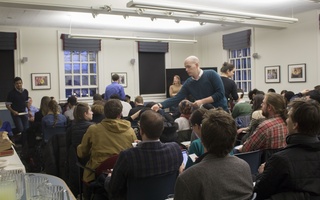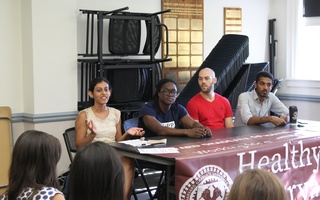{shortcode-8c82299fdadb00ed2513c368bec87d4e79eb3da7}An ongoing National Labor Relations Board hearing that could determine the fate of Harvard’s student unionization effort may soon turn to the formal objections filed by both union organizers and the University.
The NLRB hearing, which convened on February 22, continued to meet throughout the week of February 27, focusing on challenged ballots in the November unionization election which currently remains too close to call. At issue during the hearing is both the challenged ballots and the objections filed by Harvard and union organizers.
The NLRB did not hold the hearing from March 6 to March 10, but proceedings will resume on Monday. The NLRB’s decision about the validity of the objections could determine the fate of the student unionization effort at Harvard.
In December, union organizers filed their objection. They argued the election had been unfair, claiming that lists of eligible voters that Harvard had provided before the election had been inaccurate and incomplete.
If NLRB Regional Director John J. Walsh concludes that the union’s objections are valid, he could call for a re-vote.
The University also filed an objection, albeit on a much smaller scale. Lawyers representing Harvard alleged that a single ballot that the NLRB marked void should be counted. The ballot contained a mark in the box that signified a vote against unionization, and also included a short message to the vote counter and a smiley face.
In an order announcing the hearing’s date and agenda, Walsh wrote that “the Challenged Ballots and Objections raise substantial and material factual issues that may be best resolved by hearing.”
So far during the NLRB hearing, the parties have debated the eligibility of challenged ballots, votes from the November election that remain in dispute.
In its assertions about challenged ballots earlier in the hearing, the union argued that there should be a “lookback period” that gives students who had worked at most one academic year before the election the ability to vote.
“We contend that doctoral students who have been employed in the bargaining unit for at least one semester during the academic year prior to the election itself, and who were not, at the time of the election, in their dissertation year, are eligible to vote,” said Thomas W. Meiklejohn, a lawyer for HGSU-UAW, during opening arguments.
The University, however, has presented a different interpretation of NLRB case law. “There should be no lookback period,” Joseph P. McConnell, a lawyer for Harvard, said. “And it’s certainly not an anathema to the Board’s policies that there not be a lookback period.”
After the hearing ends, both parties will submit post-hearing briefs to hearing officer Thomas A. Miller. Walsh will issue his decisions, based on Miller’s recommendations, about the challenged ballots and the objections.
“The hearing process will continue until all the relevant facts and evidence are presented, and the NLRB issues its decisions based on the totality of these proceedings,” FAS spokesperson Anna Cowenhoven said.
— Staff writer Caroline S. Engelmayer can be reached at caroline.engelmayer@thecrimson.com. Follow her on Twitter @cengelmayer13.
Read more in University News
University Committee Considers Adopting Affirmative Consent Standard for Title IX Policy















